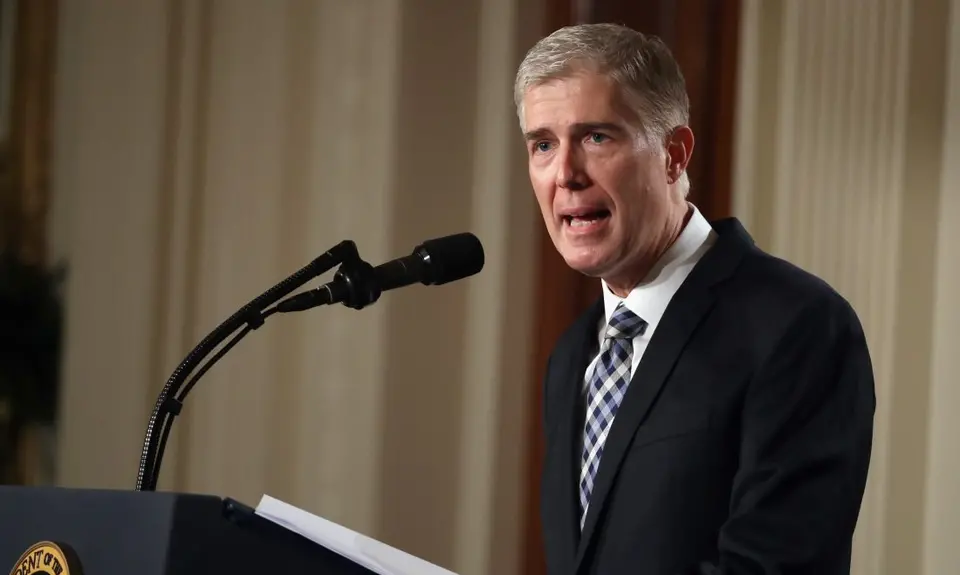Earlier this week, Judge Leonie Brinkema of the federal district court in Virginia joined the Ninth Circuit Court of Appeals in ruling against President Trump’s executive order imposing a dangerous travel ban targeting Muslims. In several respects, her decision was different than the Ninth Circuit ruling on that subject last week. Some of those differences, analyzed next to the record of Supreme Court nominee Neil Gorsuch, show the potential danger of Gorsuch being approved as a Supreme Court justice.
Some of the differences are obvious. The Ninth Circuit order refused to stay a temporary restraining order by a Washington lower court against the ban that applies to the entire country, while the Brinkema decision just applies to Virginia. But the Ninth Circuit decision is very temporary; the lower court in that case has already set a schedule that will lead to a decision soon on a preliminary injunction, in which the court will either suspend the executive order until a full trial on the merits or lift the temporary restraining order and let the ban proceed. Brinkema was one step ahead procedurally, and issued a preliminary injunction against the ban until there is a full trial on the merits.
Because it was a preliminary injunction hearing, Brinkema considered evidence on whether those challenging the ban would likely succeed on the merits of their claim that the ban was anti-Muslim. The Ninth Circuit did not consider that issue, other than to note that it would be resolved initially in the lower court. Brinkema concluded that the challengers would likely succeed. As she explained, the Supreme Court has made clear that any government action that has the purpose of promoting or discriminating against religion, or against or for a particular religion, violates the Establishment Clause of the First Amendment. The government argued that the purpose of the ban was to promote national security, as stated in the executive order itself, and that nothing else was relevant.
Based on Supreme Court precedent, however, Brinkema squarely rejected that claim. She refused to defer to Trump’s statements in the order about what its purpose was, but instead looked at past statements by Trump and his advisers, including before the election. Her conclusion was that the challengers were likely to succeed on their claim that the order had the “impermissible motive” of disfavoring Muslims seeking to enter the country and favoring Christians who wanted to become refugees.
That finding of impermissible motive is very reminiscent of a case where Gorsuch came out exactly the other way. As an appellate court judge, he has never had to deal so far with a case concerning the president’s motive. But he did write an opinion in a case concerning the motive of the governor of Utah in suspending state funding for Planned Parenthood. In that case, a panel of three judges concluded that in taking that action, the governor had the impermissible motive of penalizing Planned Parenthood for exercising its First Amendment free speech rights. The governor denied that claim but, similar to the case on Trump’s executive order, there was additional evidence, including public statements and admissions made by the governor in the litigation. Based on that evidence, the panel issued a preliminary injunction against the governor’s suspension of funds, and the full Tenth Circuit, including a number of Republican judges, decided not to rehear the case.
But Gorsuch dissented. He argued that the panel had improperly failed to respect the governor’s claims about his motive for defunding Planned Parenthood, allegedly violating the “comity” that the court should show to states and their elected officials. One of the judges who voted to deny rehearing noted specifically that the governor himself had not made that claim, and that true “comity” did not compel the court to simply accept the governor’s claims about his motivations.
Unfortunately, it is all too easy to imagine, given Gorsuch’s view in the Planned Parenthood case, what he would do in reviewing Brinkema’s decision. It is all too likely that he would say that the court should defer to President Trump’s claims about what motivated his executive order, out of “comity” or something similar, and not provide the independent review that our nation so desperately needs in the era of Trump. In fact, the Supreme Court is quite likely to be asked in the future to review Brinkema’s decision, or some similar ruling on either the current or a later executive order by Trump—which he stated yesterday will likely come as soon as next week. It would be a dangerous mistake for the Senate to elevate Judge Gorsuch to the Supreme Court to participate in such a review, as well as other likely cases challenging the actions of President Trump.
